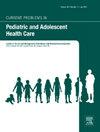The primary care providers role in high-risk pediatric cancer care
IF 3.7
4区 医学
Q1 PEDIATRICS
Current Problems in Pediatric and Adolescent Health Care
Pub Date : 2025-08-01
DOI:10.1016/j.cppeds.2025.101824
引用次数: 0
Abstract
Pediatric oncology has seen significant advancements in survival rates over the past decade, yet cancer remains the leading cause of disease-related mortality in children in the United States. In 2024, an estimated 15,000 new pediatric cancer cases were expected, with approximately 10% resulting in death. High-risk cancers, including high-grade gliomas and metastatic solid tumors, present ongoing challenges in treatment and care. This article emphasizes the critical role of primary care providers (PCPs) in the pediatric cancer continuum, particularly in supporting families through initial diagnosis, treatment, and bereavement.
PCPs often serve as the first point of contact for families, making their role in disclosing a cancer diagnosis pivotal. Effective communication strategies are essential to help families navigate the emotional landscape of a cancer diagnosis and to outline subsequent steps in care. The impact of childhood cancer extends beyond the patient, significantly affecting siblings who may experience emotional distress and unmet informational needs.
A pediatric cancer diagnosis has significant psychosocial implications for families and PCPs play a key role by providing a supportive environment for open discussions about cancer and its effects on family dynamics. If curative treatment is no longer possible and there is a shift toward palliative care, it can be helpful for PCPs to maintain continuity of care and support during end-of-life scenarios.
By fostering strong therapeutic relationships and remaining engaged throughout the cancer journey, PCPs can play a vital role in enhancing the overall well-being of pediatric cancer patients and their families, ultimately bridging the gap between specialized oncology care and the medical home.
初级保健提供者在高危儿童癌症护理中的作用
在过去的十年中,儿童肿瘤学在生存率方面取得了重大进展,但癌症仍然是美国儿童疾病相关死亡的主要原因。2024年,预计将有1.5万例新的儿科癌症病例,其中约10%导致死亡。高风险癌症,包括高级别胶质瘤和转移性实体瘤,在治疗和护理方面面临着持续的挑战。这篇文章强调了初级保健提供者(pcp)在儿童癌症连续体中的关键作用,特别是在通过初始诊断、治疗和丧亲支持家庭方面。pcp通常是家庭的第一个联络点,这使得他们在披露癌症诊断方面的作用至关重要。有效的沟通策略对于帮助家庭应对癌症诊断带来的情绪波动以及勾勒出后续护理步骤至关重要。儿童癌症的影响超出了患者本身,严重影响到可能经历情绪困扰和信息需求未得到满足的兄弟姐妹。儿童癌症诊断对家庭具有重要的心理社会意义,pcp通过提供一个支持性环境,公开讨论癌症及其对家庭动态的影响,发挥了关键作用。如果治愈性治疗不再可能,并且转向姑息治疗,那么pcp在生命末期情景中保持护理和支持的连续性是有帮助的。通过培养强大的治疗关系并在整个癌症过程中保持参与,pcp可以在提高儿科癌症患者及其家庭的整体福祉方面发挥至关重要的作用,最终弥合专业肿瘤护理和医疗家庭之间的差距。
本文章由计算机程序翻译,如有差异,请以英文原文为准。
求助全文
约1分钟内获得全文
求助全文
来源期刊
CiteScore
4.60
自引率
0.00%
发文量
61
审稿时长
5 days
期刊介绍:
Recognized for its probing, comprehensive, and evidence-based reviews, Current Problems in Pediatric and Adolescent Health Care devotes each issue to a timely and practical topic in pediatric medicine, presented by leading authorities in the field. The journal offers readers easily accessible information that enhances professional experience and is pertinent to daily pediatric practice. Each issue''s review article is accompanied by an additional special feature designed to highlight a particular aspect of the topic presented.

 求助内容:
求助内容: 应助结果提醒方式:
应助结果提醒方式:


